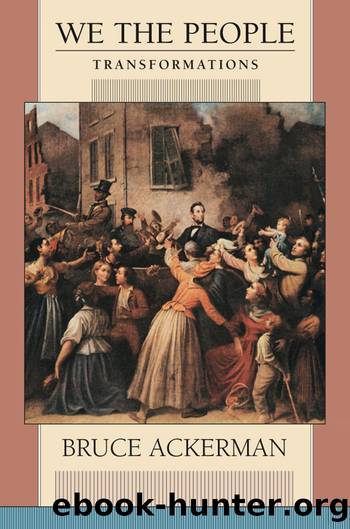We the People, Volume 2: Transformations by Bruce Ackerman

Author:Bruce Ackerman [Ackerman, Bruce]
Language: eng
Format: epub
Tags: History, United States, General, Law, Constitutional
ISBN: 9780674736627
Google: EiFFCQAAQBAJ
Publisher: HarvardUP
Published: 2000-09-15T21:22:03+00:00
THE VIEW FROM ARTICLE FIVE
We can now begin to triangulate our problem by considering the New Dealâs relationship to the Founding. Speaking broadly, the higher lawmaking efforts of the 1930âs broke with the premises of Article Five in two ways.
The first involved a break from the Founding system of authorizing institutions. Article Five rests upon a federalist premise: in order to speak in the name of the People, a movement must gain the assent of both national and state institutions. The New Dealers took a more nation-centered courseâusing a series of national electoral victories as mandates that ultimately induced all three branches of the national government to recognize that the People had endorsed activist national government. So long, then, as modern lawyers suppose that all successful popular movements must take a federalist path to higher lawmaking authority, they will never surmount this first hurdle to a mature recognition of the New Dealâs constitutional creativity.
But it shouldnât be too hard to jump over this hurdle. As we have seen, it was the Reconstruction Republicans, not the New Deal Democrats, who first established that We the People could speak through national institutions and demand that the states accept the primacy of American citizenship. If Reconstruction Republicans could use national institutions to legitimate their claims, why not New Deal Democratsâespecially when they had gained the sustained consent of majorities in all regions of the country, while the Republicans had a lot more support in the North than in the South?
Which brings us to a second aspect of the New Deal break with Article Five. While the Reconstruction Republicans repudiated the federalist premises of the Founding, they memorialized their revolutionary reforms by placing them in legal packages that resemble Article Five amendmentsâbearing the numbers XIII and XIV and placing themselves in sober sequence with other amendments of less uncertain pedigree.15 In contrast, when modern lawyers seek to recall the New Dealâs contribution, they do not turn to writings that pose as Article Five amendments but to transformative judicial opinions written in the aftermath of the Court-packing crisis. These great cases mark the decisive institutional moment at which the Supreme Court joined the other branches in rejecting the Republican vision of limited government, symbolized by Hammer v. Dagenhart and Lochner v. New York. Indeed, modern judges are more disturbed by the charge of Lochnering than the charge of ignoring the intentions of the Federalists and Republicans who wrote the formal text. To mark this point, I shall say that the transformative opinions handed down by the New Deal Court function as amendment-analogues that anchor constitutional meanings in the same symbolically potent way achieved by Article Five amendments.
Undoubtedly, this New Deal use of amendment-analogues requires thoughtful reappraisal of some pious platitudesâincluding the sense in which Americans live under a written constitution. Two centuries after the Founding, this platitude remains valid only on an expanded understanding of the constitutional canon. The corpus of authoritative texts includes not only those formal amendments generated by the procedures of Article
Download
This site does not store any files on its server. We only index and link to content provided by other sites. Please contact the content providers to delete copyright contents if any and email us, we'll remove relevant links or contents immediately.
The Secret History by Donna Tartt(19083)
The Social Justice Warrior Handbook by Lisa De Pasquale(12190)
Thirteen Reasons Why by Jay Asher(8907)
This Is How You Lose Her by Junot Diaz(6885)
Weapons of Math Destruction by Cathy O'Neil(6279)
Zero to One by Peter Thiel(5798)
Beartown by Fredrik Backman(5751)
The Myth of the Strong Leader by Archie Brown(5507)
The Fire Next Time by James Baldwin(5440)
How Democracies Die by Steven Levitsky & Daniel Ziblatt(5218)
Promise Me, Dad by Joe Biden(5153)
Stone's Rules by Roger Stone(5087)
A Higher Loyalty: Truth, Lies, and Leadership by James Comey(4959)
100 Deadly Skills by Clint Emerson(4924)
Rise and Kill First by Ronen Bergman(4787)
Secrecy World by Jake Bernstein(4751)
The David Icke Guide to the Global Conspiracy (and how to end it) by David Icke(4717)
The Farm by Tom Rob Smith(4506)
The Doomsday Machine by Daniel Ellsberg(4489)
